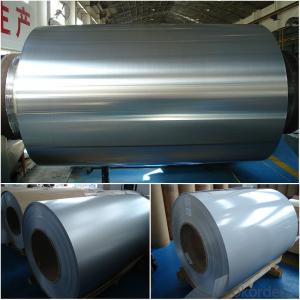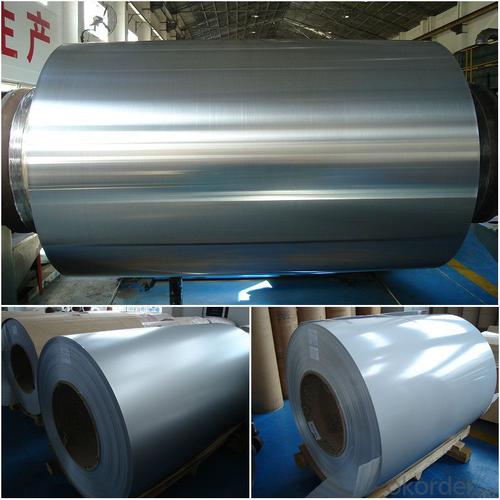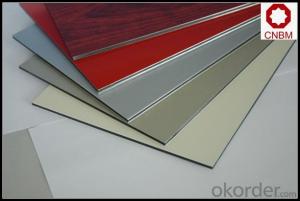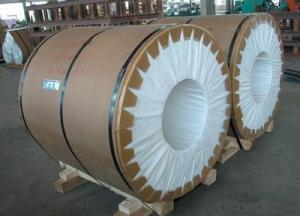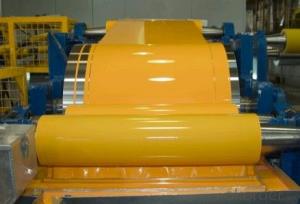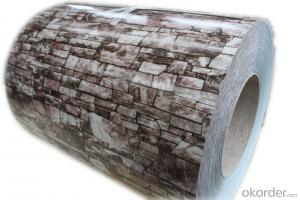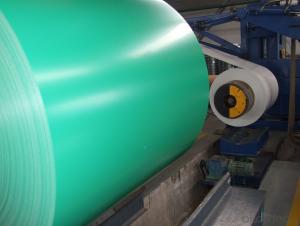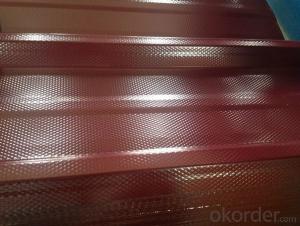China Black Aluminum Coil for ACP - Color Coated Aluminum Coil
- Loading Port:
- China Main Port
- Payment Terms:
- TT OR LC
- Min Order Qty:
- -
- Supply Capability:
- -
OKorder Service Pledge
OKorder Financial Service
You Might Also Like
Color coated aluminum coil isa material with excellent acid-resistance and alkali-resistance. The coating layeris even with bright color to last for a very long time. It is a greendecoration material with the characters of environment protection,flame-resistance, and groovy colors. In nowadays, the color coatedaluminum coil has become the popular material for top grade decoration. With our advance professional aluminum coated technique, wecan custom various aluminum coils ,like coated aluminum coil , Color coatedaluminum coil , embossed aluminum sheet with the color and size which youdemands.
1)Process: pre-treatment, continuous painting and baking for times .
2)Material: high quality material, aluminum sheets from South West AluminumIndustry Company in China, pre-treatment material from Henkel & Chemtellfrom Germany, more than 70% of PVDF coating from PPG Corp., the USA andpolyester from Sweden Becker Industrial Coating Co., Ltd.
3) Ourproducts can keep excellent quality and stability.
4)Thickness: 0.06 - 1.0mm; width: 20 - 1,590mm
Applications:
The aluminum coils are widely used in ACP/curtainpanel/honey comb panel/shutter/roofing and most of the decoration areas. Withthe superior quality and advanced management, our products had been export toEuro/North America /East Asia and many other areas and countries.
PEAluminum Coating Coils for ACP
Featuresof PE Aluminum Sheet:
1.Adopting precision rolling coating technology, our PVDF and PE coated coil canensure excellent adhesive without coating omission.
2. For thePE coated aluminum coil we produced, there are various colors for your choice.
3. Usinginfrared heating technology to protect environment from pollution.
4. Ourcoated aluminum coil has four-roller coating line, uniform coating thicknessand good features.
RawMaterial of the PE Aluminum Coating Coils:
1. Aluminum Coil: high strength aluminum withalloy of AA1100 (aluminum alloy is available with AA3003, AA3005, AA5005according to customer)
2. Surface Paint: PE, PVDF and specialpaints.
Specification of PE Aluminum Coating Coil
Width: 20mm~1590mm
Thickness: 0.06mm~1.0mm
External Diameter: ≤ 1500mm
Internal Diameter: 405mm, 505mm, 150mm, 75mm
Coil weight: ≤ 4000kg
PE coated aluminum coil is processed throughthe technics of roller coating and baking with precise polyester paints. Itscolor is glossy and with variety of colors enabling you to choose easily.Chromatic aberration is small, impact resistance is strong and easy to beprocessed, and all its performance has reached or surpassed the nationalcriteria. The products are widely used in indoor and door decoration, ceilings,room surface tiles, corrugated boards, wallpanels, advertisement boards, counters, home appliances, decoration in and outof autos and boats.
Performance of thecoating
Aluminum Thickness | Coating Thickness | MEK | T- Bend | Impact | Adhesion | Pencil Hardness | Boiling Water Proof |
0.3-1.5mm | ≥18μm | ≥100 Times | ≤2T | 50 kg•cm | 0 Grade | ≥HB | no change within 2 hours |
0.2-0.28mm | ≥18μm | ≥100 Times | ≤2T | 30kg•cm | 0 Grade | ≥HB | no change within 2 hours |
0.15-0.18mm | ≥18μm | ≥100 Times | ≤3T | 20 kg•cm | 0 Grade | ≥HB | no change within 2 hours |
0.08-0.12mm | ≥16μm | ≥80 Times | ≤4T | 10 kg•cm | ≤1 Grade | ≥HB | no change within 1 hour |
0.022-0.06mm | ≥12μm | ≥50 Times | - | - | ≤1Grade | ≥HB | no change within1 hour |
Color of Card
PE (polyester)
PE
Color Match
For custom' color requests, we can deal as following:
1. Supply a physical sample of custom color. A color sample on metal ispreferred. If other, it is also acceptable. But the color matching rate may benot good as color on metal.
2. New color sample is usually offered by our paint supplier in 5-7 days,special color should be in 7-10 days.
3. Upon receipt of color sample, please approve in writing as soon as possible.Once you approved, we will arrange purchasing and production.
Note: Color difference maybe occurred in different production batch, so it issuggested all panels are placed in one order for same project. And keep samedirection as arrow on protective film when installing to avoid any colordifference by vision
- Q: Are aluminum coils compatible with different welding methods?
- Different welding methods can be used with aluminum coils. Aluminum is a versatile metal that can be welded using techniques like gas tungsten arc welding (GTAW) and gas metal arc welding (GMAW). These methods are commonly used for welding aluminum coils because they produce high-quality welds. GTAW, also known as TIG welding, is particularly suitable for aluminum. It allows for precise control of heat input and produces excellent weld quality. TIG welding uses a non-consumable tungsten electrode and an inert gas like argon to protect the weld zone from contamination. GMAW, also known as MIG welding, is a faster process that uses a consumable wire electrode and a shielding gas to protect the weld pool. It is widely used in industrial applications due to its efficiency and ease of use. In addition to TIG and MIG welding, other methods like laser welding and friction stir welding can also be used for aluminum coils, depending on specific requirements. Proper preparation is crucial for successful welds. Cleaning and surface treatment of the aluminum coils are important to remove contaminants or oxide layers that could affect the welding process. Overall, different welding methods can be used with aluminum coils, and the choice depends on factors like desired weld quality, production requirements, and available skills and equipment.
- Q: What are the thermal expansion properties of aluminum coils?
- The dimensions of aluminum coils change with temperature variations, which is known as their thermal expansion properties. Aluminum has a relatively high coefficient of thermal expansion, causing it to expand and contract more than other materials when exposed to temperature changes. The coefficient of thermal expansion for aluminum is approximately 22.2 x 10^-6 per degree Celsius. This means that for every degree increase in temperature, the length, width, and thickness of the aluminum coils will increase by around 22.2 parts per million. Conversely, when the temperature decreases, the coils will contract accordingly. These thermal expansion properties have significant implications in various applications that involve the use of aluminum coils. For instance, in heating and cooling systems, it is crucial to carefully consider the expansion and contraction of aluminum coils caused by temperature changes to ensure proper functioning and prevent damage. Likewise, in construction, where aluminum coils are commonly used for roofing and cladding, understanding their thermal expansion properties is vital to avoid structural issues and maintain the building's integrity. It is worth noting that the coefficient of thermal expansion may slightly differ depending on the specific aluminum alloy used in the coils. Furthermore, factors like coil thickness and shape can also affect the thermal expansion behavior. Therefore, when working with aluminum coils, it is advisable to refer to the material specifications or seek guidance from experts to accurately determine the thermal expansion properties and incorporate them into the design and application processes.
- Q: When you are cooking fish? I ran out of aluminum foil, all I have is parchment paper on hand. Does it matter or affect the way the fish gets cooked? Just wondering what the difference is, if any.
- Aluminum foil will heat faster and retain that heat. Parchment paper will retain little heat but the fish won't stick to it when you remove it from the oven.
- Q: Can aluminum coils be used in the production of electronic components?
- Yes, aluminum coils can be used in the production of electronic components. Aluminum is a commonly used material due to its lightweight, conductivity, and corrosion resistance properties. It is often used in electronic devices such as capacitors, inductors, and transformers.
- Q: What is the tensile strength of an average aluminum coil?
- The tensile strength of an average aluminum coil can vary depending on the specific alloy and manufacturing process used. However, commonly used aluminum alloys typically have a tensile strength ranging from 100 to 300 megapascals (MPa).
- Q: What is the maximum operating temperature for aluminum coils?
- The maximum operating temperature for aluminum coils typically depends on the specific grade of aluminum being used. However, in general, aluminum has a high melting point of around 660 degrees Celsius (1220 degrees Fahrenheit). This means that it can withstand relatively high temperatures without melting or deforming. For most common grades of aluminum, the maximum operating temperature is usually between 200 and 300 degrees Celsius (392 and 572 degrees Fahrenheit). However, it is important to note that this temperature range may vary depending on factors such as the thickness of the coils and the specific application they are being used for. In applications where higher temperatures are expected, it is advisable to use aluminum alloys that have been specifically designed to withstand higher temperatures. These alloys, such as aluminum alloy 6061, can have maximum operating temperatures of up to 400 degrees Celsius (752 degrees Fahrenheit) or even higher. It is always recommended to consult the manufacturer's specifications and guidelines for the specific aluminum coils being used to ensure that they are operated within their safe temperature limits.
- Q: How do aluminum coils compare to stainless steel coils in terms of durability?
- When it comes to durability, there is a notable distinction between aluminum coils and stainless steel coils. In general, stainless steel coils are regarded as more long-lasting compared to their aluminum counterparts. This is primarily due to the fact that stainless steel possesses exceptional resistance to corrosion and has a longer lifespan. Stainless steel's resistance to corrosion is higher, making it ideal for utilization in challenging settings or situations where exposure to moisture, chemicals, or high temperatures is prevalent. It is less prone to rusting or developing corrosion spots, ensuring a lengthier existence and preserving its structural integrity over time. On the flip side, aluminum coils are more susceptible to corrosion, particularly in environments with high humidity, saltwater, or acidic conditions. To enhance their corrosion resistance, aluminum coils are often coated or treated. However, despite these measures, they may still be susceptible to corrosion over time, which can compromise their durability. However, it is important to note that the durability of both aluminum and stainless steel coils can also be influenced by other factors including the quality of the materials, the manufacturing process employed, and the level of maintenance and care provided. Regular cleaning, appropriate storage, and preventive measures can contribute to extending the lifespan of both types of coils. To summarize, although both aluminum and stainless steel coils have their own advantages and disadvantages, stainless steel coils typically offer superior durability due to their heightened resistance to corrosion. Nevertheless, when determining the most suitable option for a specific situation, it is essential to also consider the specific application, environment, and maintenance practices involved.
- Q: Can aluminum coils be used for insulation purposes?
- Using aluminum coils for insulation purposes is not possible. This is because aluminum has high heat and electricity conductivity, meaning it would transfer heat instead of insulating it. Insulation materials are selected based on their capacity to resist heat flow and decrease energy transfer. Commonly used insulation materials include fiberglass, foam, and mineral wool, which have low thermal conductivity and effectively trap air pockets to minimize heat transfer.
- Q: I want to make arrows for my bow that making, i have an idea of making a wooden mold and then finding the melting point of aluminum foil and melt it, prob is that i dont have anything to melt it with my moms oven goes up to only 500F and i need one up to 1240F
- Forget it. 1. Molten aluminum can burn in air. 2. Molten aluminum will set fire to a wood mold. - (Wood catches fire about 450 F.) 3. You haven't a clue how dangerous molten metal can be to handle.
- Q: Can aluminum coils be recycled multiple times?
- Yes, aluminum coils can be recycled multiple times. Aluminum is a highly recyclable material, and the recycling process does not degrade its quality. This means that aluminum coils can be melted down and reformed into new coils multiple times without any loss in their performance or properties. Recycling aluminum not only helps to conserve natural resources but also saves energy compared to producing new aluminum from raw materials. Therefore, aluminum coils are a sustainable and environmentally friendly choice that can be recycled multiple times.
Send your message to us
China Black Aluminum Coil for ACP - Color Coated Aluminum Coil
- Loading Port:
- China Main Port
- Payment Terms:
- TT OR LC
- Min Order Qty:
- -
- Supply Capability:
- -
OKorder Service Pledge
OKorder Financial Service
Similar products
Hot products
Hot Searches
Related keywords
